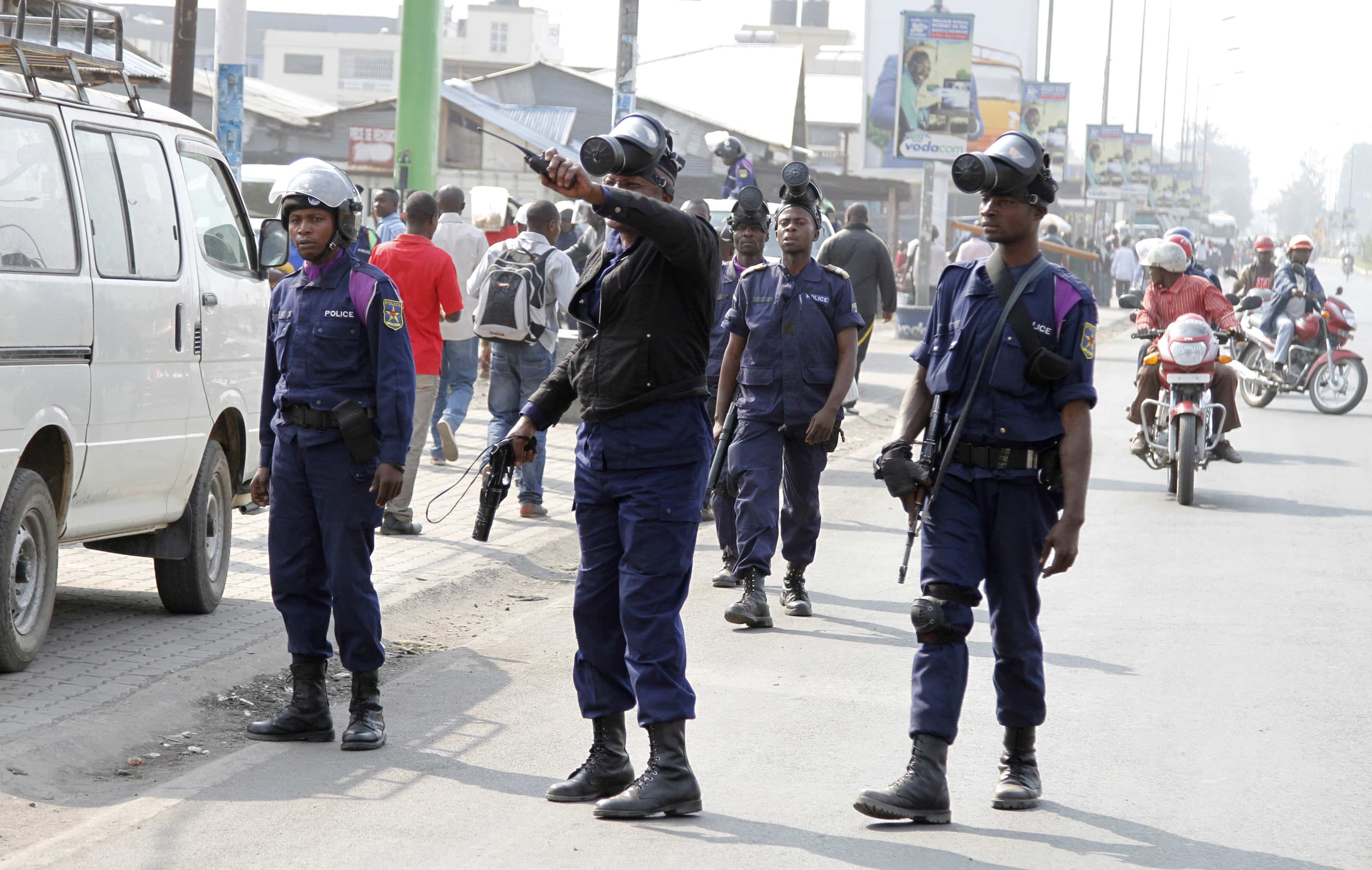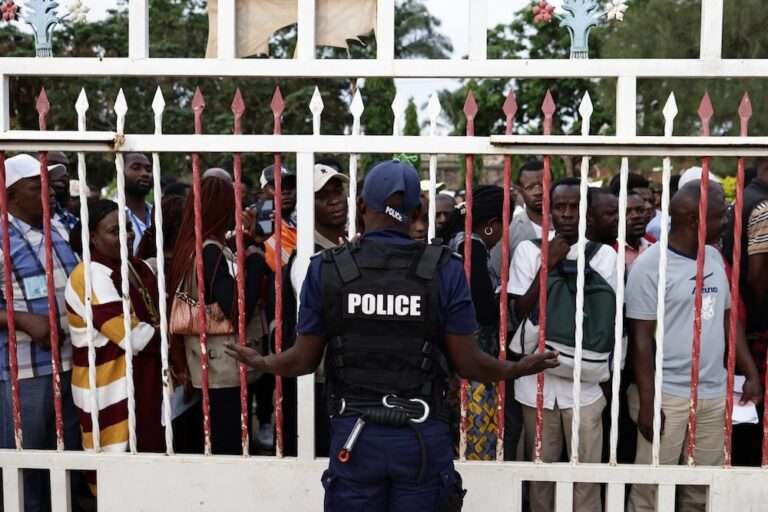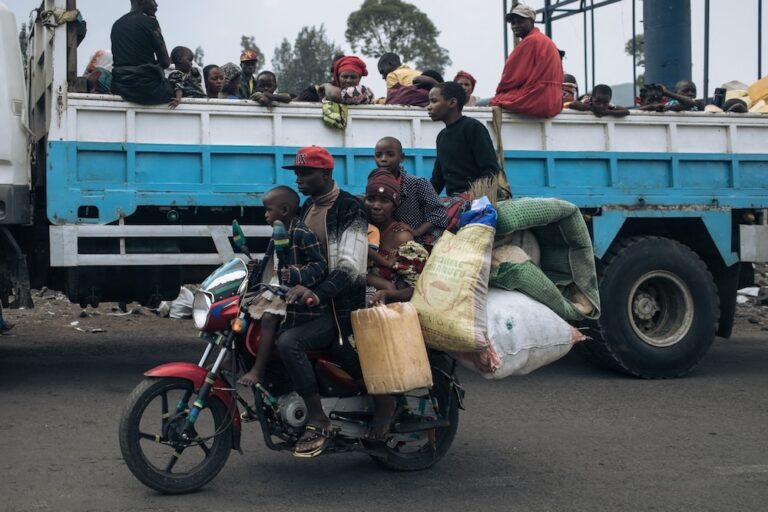The demonstrators were protesting proposed changes to the electoral law that many believed would permit President Joseph Kabila to stay in office beyond his mandated two-term limit.
This statement was originally published on hrw.org on 24 January 2015.
The government of the Democratic Republic of Congo has used unlawful and excessive force to crack down on protests since January 19, 2015, Human Rights Watch said today. The demonstrators were protesting proposed changes to the electoral law that many Congolese believed would permit President Joseph Kabila to stay in office beyond his mandated two-term limit.
Human Rights Watch confirmed that 36 people, including one police officer, were killed during the demonstrations in Kinshasa, Congo’s capital. Of these, Congo’s security forces fatally shot at least 21 people. Additionally, on January 22, at least four people were killed during demonstrations in the eastern city of Goma.
“Congolese security forces have fired into crowds of demonstrators with deadly results,” said Ida Sawyer, senior Congo researcher at Human Rights Watch. “People should be allowed to express their views and peacefully protest without the fear of being killed or arrested.”
On January 17, the National Assembly adopted modifications to the electoral law that would require a national census ahead of the next election, a step that could significantly delay presidential and parliamentary elections scheduled for 2016. On January 23, following a week of protests, the Senate adopted an amended version of the law, clarifying that the holding of elections would not be conditional on a census being completed and that the constitution’s electoral timeframe would be respected. If signed into law, the amended law would address a main concern of the protesters.
Demonstrations were held in cities across the country, including Kinshasa, Bukavu, Bunia, Goma, Lubumbashi, Mbandaka, and Uvira. In Kinshasa, protesters demonstrated on January 19, 20, and 21 near the Palais du Peuple parliament building, around the University of Kinshasa, and in Bandal, Kalamu, Kasa-vubu, Kimbanseke, Lemba, Limete, Makala, Masina, Matete, Ndjili, and Ngaba communes.
Many of the demonstrations turned violent after members of the Congolese National Police and the Republican Guard presidential security detail fired teargas and live ammunition into the crowds. The demonstrators in some cases hurled rocks at the security forces and looted and burned shops and offices of perceived government supporters.
Human Rights Watch documented a number of instances in which police or Republican Guard soldiers took away the bodies of those shot in an apparent attempt to remove evidence of the killings. Republican Guard forces also fired indiscriminately in a hospital, seriously wounding three people.
Opposition leaders had called on supporters to mobilize against the proposed revisions beginning on January 19. They urged people to stay home from work and school and instead to take to the streets to “save our nation in danger” and urge Kabila to step down at the end of his term, in 2016.
On the evening before protests began, government authorities blocked opposition leaders at their party headquarters in Kinshasa. Several were arrested in Goma and Kinshasa in the following days. Early in the morning on January 20, authorities shut down all Internet and text message communication in Kinshasa and other parts of Congo. It was partially restored on January 22. Several opposition leaders said their phone numbers have been blocked.
Congo’s national police commissioner, Gen. Charles Bisengimana, told Human Rights Watch on January 23 that 12 people, including at least one policeman, had been killed during the demonstrations in Kinshasa earlier in the week. He said the police force is investigating the exact circumstances of the deaths.
The United Nations Basic Principles on the Use of Force and Firearms by Law Enforcement Officials, which set out international law on the use of force in law enforcement situations, provide that security forces shall as far as possible apply nonviolent means before resorting to the use of force. Whenever the lawful use of force is unavoidable the authorities should use restraint and act in proportion to the seriousness of the offense. Lethal force may only be used when strictly unavoidable to protect life. Under the Basic Principles, in cases of death or serious injury, appropriate agencies are to conduct a review and a detailed report is to be sent promptly to the competent administrative or prosecutorial authorities.
The Congolese authorities should immediately stop the unlawful and excessive use of force by the security forces and prosecute those responsible for killings and other abuses, Human Rights Watch said. They should also investigate the January 21 shooting at Kinshasa’s General Hospital. Political party leaders should not incite supporters to violence or hostility, and should urge them not to use violence.
“The Congolese government has fired upon peaceful protesters and detained opposition leaders in a blatant attempt to silence dissent,” Sawyer said. “The authorities should urgently ensure that everyone is allowed to protest peacefully and voice their concerns without government interference.”
Unlawful and Excessive Force by Security Forces
Human Rights Watch documented at least 21 fatal shootings of civilians by Congolese government security forces during demonstrations in Kinshasa on January 19, 20, and 21, 2015.
At least six of those killed were students from the University of Kinshasa and other schools who had participated in the demonstrations. A student from the Higher Institute of Applied Techniques (ISTA) described the shooting to death of one of his classmates during a demonstration on January 19:
“When we were marching toward the Palais du Peuple, the police blocked the road so we couldn’t pass. They started dispersing us by firing live bullets into the crowd. That was when our friend was hit by a bullet and died. The Republican Guard then came and took his body away. We were all angry and started throwing rocks. Then the police and Republican Guard really started firing at us so we all started to flee.”
Students at the University of Kinshasa told Human Rights Watch that they were afraid to leave their rooms, with police and Republican Guard soldiers deployed throughout the campus. On January 21, police fired teargas into students’ dormitory rooms.
On January 20, security forces fired into a small crowd of demonstrators in Masina commune, fatally shooting in the head a young man who worked across the street. Republican Guard soldiers returned 30 minutes later and took away his body. Also that day, security forces shot a woman in the chest, killing her, during a demonstration in Lemba commune.
Human Rights Watch documented 13 cases in Kinshasa in which the security forces shot and wounded demonstrators and bystanders. Republican Guard soldiers shot a man in the foot when they saw him filming them from a balcony as they attempted to disperse a demonstration in Matete commune. On January 19, a bullet fired into a crowd of demonstrators in Kasa-Vubu commune struck an infant, injuring her in the hip.
A 19-year-old man who was shot and wounded in the chest during a demonstration in Matete commune on January 20 told Human Rights Watch:
“I wasn’t part of the demonstration, but my parents had sent me out to buy phone credit. Suddenly I saw people starting to run and the police firing on the crowd. I felt that I was hit, fell down, and lost consciousness. When I came to, I was at the hospital.”
In the afternoon of January 21, several opposition leaders and members of parliament visited Kinshasa’s General Hospital, known as “Mama Yemo,” to comfort and support demonstrators injured during the protests. The opposition leaders said a female government security agent in civilian clothes told them to leave soon after they arrived at the hospital, and that she told the injured demonstrators they would “disappear” if they continued talking to the opposition leaders. Minutes after the opposition leaders left the hospital, Republican Guard soldiers arrived and fired their guns indiscriminately around the hospital, seriously wounding three visitors.
Arbitrary Arrests
Congolese authorities arbitrarily arrested opposition leaders in an apparent attempt to silence them. Prior to the first demonstration on January 19, security forces blocked two prominent opposition leaders – Vital Kamerhe, head of the Union for the Congolese Nation (UNC), and Jean-Claude Muyambo, head of the Congolese Solidarity for Development (SCODE) – at the UNC headquarters in Kinshasa. Kamerhe and other opposition leaders told Human Rights Watch that over 20 uniformed police were deployed outside the office to prevent them from leaving from 1 a.m. until about 3:30 p.m.
Early on January 20, police forcibly entered Muyambo’s home and arrested him. Muyambo was one of the primary opposition leaders involved in mobilizing people to demonstrate. He was taken before a judge and charged with “abuse of confidence” and selling a building that did not belong to him, based on a complaint that had been brought against him by a client in 2002 – and later withdrawn – in his home province of Katanga. Muyambo was immediately transferred to Kinshasa’s central prison.
The authorities also arrested the SCODE secretary-general, Cyrille Dowe, on January 19. He was accused of “threatening state security” because he had photographed security forces during demonstrations. He is being held at a police jail in Kinshasa.
At about 8 p.m. on January 21, two police officers and two men in civilian clothes confronted Christopher Ngoy, a human rights activist who had been involved in mobilizing people to participate in the demonstrations, as he was meeting with colleagues at an outdoor bar. The men forced him into an unmarked white jeep and drove off. His family members and colleagues have been unable to locate him.
In Goma, the authorities arrested at least 26 people, including several prominent opposition leaders, during demonstrations on January 19. Twelve were provisionally released on January 21, and three were transferred to a children’s court.
Violence by Demonstrators
Demonstrators have also been responsible for violence, Human Rights Watch said. After police officers shot and killed a protester on January 19, demonstrators threw rocks at a police officer, killing him. Demonstrators also looted dozens of Chinese-owned shops and other business and offices perceived as being pro-government, burned tires in the streets, and threw rocks at vehicles. During a march in support of Kabila and Governor André Kimbuta Yango of Kinshasa on January 21, opposition supporters threw rocks at marchers, injuring several.
Background
Kabila has been in power since 2001, following the assassination of his father, former President Laurent Désiré Kabila. Kabila was declared the winner following elections in 2006 and 2011. The country’s constitution allows for a president to serve only two consecutive terms.
The Republican Guard is a force of about 12,000 soldiers whose primary task is to guard the president. Under Congolese law, the Republican Guard has no responsibility for public order. The Congolese National Police are responsible for providing security and ensuring public order during demonstrations. The national police chief can call on the regular Congolese army, not the Republican Guard, to provide assistance if police forces are overwhelmed.
The police commander for Kinshasa, Gen. Céléstin Kanyama, has a long record of involvement in serious human rights abuses, including during Operation Likofi, a brutal police operation to fight gang crime in Kinshasa. Human Rights Watch has called on Congolese authorities to suspend him pending a judicial investigation into his alleged role in these abuses.



